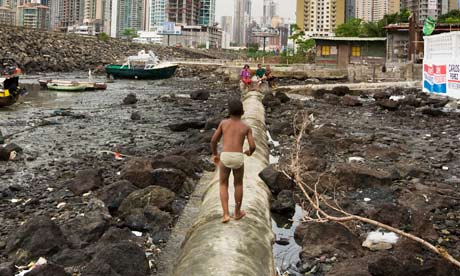A Legacy of Corruption Marches on: New Insight into Panama’s Infamous Lucom Case
- One year after COHA’s first publication, Richard Lehman continues to fight for the rights of the poor children of Panama
- The Supreme Court’s corrupt ruling triggers a District Court prosecutor to take a stand, resulting in a judicial stalemate
- Panama’s underhanded politics exponentially increase value of Hacienda Santa Monica, the most precious asset in the Lucom estate
Lucom and Lehman Saga Carries On
Just five years after his death, Wilson Charles Lucom, a multimillionaire expatriate born in Pennsylvania, still cannot rest in peace. Lucom’s last testament dictated that a variety of liquid and physical assets worth upwards of USD 50 million were to be sold, with the proceeds to be consigned to the Wilson C. Lucom Foundation, a trust established in order to provide needy children of the tiny Central American country with food and resources. However, Lucom’s third wife, Hilda Arias of Panama’s all-powerful Arias clan, has extensive connections with a number of political power hitters in the Panamanian establishment. Using her influence, her agents have claimed the entire estate for Hilda herself, creating a far different scenario than the U.S. millionaire ever envisioned.
Richard S. Lehman, a highly regarded Florida tax lawyer and long-time friend of the conservative philanthropist, was appointed by the Panama Probate Court as sole Executor of Lucom’s will. The instructions were explicit and the task was simple: the drawn up bequest, totaling millions of dollars, was to be donated to the foundation and distributed in the form of daily meals to thousands of deserving children. However, it has been just over five years since Lucom’s death, and Lehman continues to face a heartlessly corrupt legal establishment in a no-hold battle against the Arias family’s crusade to nullify the will, install Hilda as sole executor, and quickly siphon off Lucom’s assets.
Throughout his protracted legal battle, Lehman has faced countless instances of harassment. These have included a barrage of appeals, a murder charge, multiple bribery scandals, a criminal gang charge, two international imprisonments, and even an Interpol “dangerous criminal” alert — all of which were later thrown out or proven false. Finally, in 2009, Lehman filed a petition with the Inter-American Commission on Human Rights, marking a last-ditch attempt to break free from the coils of endless litigation in the pursuit of definitive justice.
After four years of turmoil, COHA issued a report on the case, helping to keep the dramatic affair in the public eye. Published in July 2010, “Hungry for Justice: Corrupt Courts in Panama Deny Impoverished Children USD 50 Million in Inheritance,” paints a grim, yet accurate picture of a ruthlessly corrupt political establishment composed of high ranking officials and political forces including members of the country’s Supreme Court. These forces remain bent on thwarting Lucom’s wishes, even if it means defaming Lehman’s professional integrity and threatening the future welfare of the ill-fated children of Panama. While the case has been sitting with the Supreme Court, waiting for judgment day, UNICEF came out with a deeply disturbing report, revealing that a third of Panama’s children still live in extreme poverty and are subject to abysmal living standards. As Lehman stated a year ago, “all we can do now is keep the light on this case and wait for a ruling.”[1]

One Year Update
If successfully executed, Lucom’s gift would represent the largest single charitable donation in Panama’s history. By late August of 2010, Lehman had successfully managed to overturn (or dismiss) every single corrupt ruling issued by Panama’s judiciary.[2] Yet in a major setback just one month after COHA’s original publication regarding the case, Panama’s Supreme Court overturned the probate and the appellate court’s ruling, declaring Lucom’s will void and assigning the entire estate to his now ailing wife, Hilda. As one Panamanian reporter explained, three judges sitting on the Supreme Court who are politically tied to the Arias family’s wealth and influence, used Hilda’s contrived persona as a loving wife to redirect and alter Lucom’s will.[3] They argued that Hilda, as Lucom’s ‘beloved wife,’ holds a higher, more sanctified position than the rest of the legatees, and should therefore be awarded executive authority in the matter. These nefarious judges, who Panamanian President Ricardo Martinelli referred to as the “three blind mice,” are Oyden Ortega Duran, Harley J. Mitchell and Alberto Cigarruista C.
Yet some observers insist that all is not lost. Immediately after the corrupt opinion was filed in August 2010, Mario Chizmar, the public notary who witnessed, transcribed, and swore to the filing of Lucom’s will, filed a Criminal Complaint in the Panamanian Congress against the three allegedly venal Supreme Court Justices who had issued the ruling. This criminal complaint and another constitutional challenge known as the “Amparo,” consequently froze the implementation of the corrupted ruling so that it could not be enacted until the entire membership of the Supreme Court had decided to rule in unison on the issue.
District Court Miracle leads to a Renewed Sense of Hope
After months of waiting in near desperation for a verdict on Chizmar’s motion, a new and surprising source of hope was unveiled in the lower court system this past April. Maruquel Castroverde, the Fourth Superior Prosecutor for the First Judicial District of Panama, decided to take a stand for justice, despite the huge political implications it could have for her own career. Castroverde filed a nullification motion, requesting that the Panama Probate Court dismiss every action that had occurred in the Lucom case since June 5, 2006 — only leaving in place Order No. 1025, which originally appointed the children’s foundation as the universal heir of the Lucom Estate, and Richard Lehman as its Executor. The prosecutor’s motion argues that the proceedings are invalid because her office, which had a legal responsibility to protect the poor children of Panama, was never properly served. If effectively implemented, this motion would be tantamount to winning the case, allowing Lucom’s money to be donated to his foundation and ending the highly suspicious control exerted by the Panamanian government over the estate.
However, this motion will be subject to the decision of Judge Juan Bosco Molina, arguably the most corrupt judge to ever reside within the country’s notoriously unethical judicial system. In fact, Molina was already under indictment for supposedly selling his office to the highest bidder before he sat in on the Lucom case. Finally, as further evidence of Panama’s suspicious political characters, the U.S. Department of State deemed it necessary to revoke the visas of the three corrupt justices who issued the illegal ruling. Lehman called the Panamanian businessman who reported on the development, and who has chosen to remain anonymous, as “the only credible individual in Panama who has dared to stand up for the poor children himself.”[4]
Hacienda Santa Monica: Increase in Value, Increase in Risk
As a further complication resulting from the continuous legal wrangling, Panama’s new international airport is scheduled to be placed within the same district of Lucom’s Hacienda Santa Monica. The international airport has brought with it a new vision for a sprawling Panamanian global city, located just one hour outside of Panama City. With plans for a grand casino and a marina for mega yachts, the projected real estate development costs could reach more than USD 5 billion. Thus, the 7,000 acre ranch, now Lucom’s main asset, has increased in worth to approximately USD 100 million, an amount that no Panamanian child could possibly conceptualize.
Conclusion: Waiting with Trepidation
How can one assess the compromised standing of a country whose Supreme Court justices blatantly and knowingly participate in the corruption of the law, resulting in the further immiseration of their most helpless citizens? The Lucom case serves as a telling indictment of Panama’s judicial system, as it provides absolute proof of corrupt legal actions and decisions taken by judiciaries throughout Panama’s court system.
Furthermore, the Lucom case also shows even greater inadequacies in the country’s Judiciary. The system of checks and balances are lamentably voided on a daily basis in the country. The Legislative branch is supposed to serve as a check on the Judiciary. However, since the Legislative branch allows the Judiciary to routinely trample its own standards, officials obviously find it difficult, and more importantly, extremely unprofitable to stop the entire Executive branch from further acts of corruption.
As any self-respecting citizen must be made aware, the country’s Legislative branch has the power to discipline the Judiciary by impeaching a corrupt justice. Yet this check on abusive power has never been carried out in a comprehensive manner. It is clear that the Lucom case requires the full force of the people’s sense of justice, and that the right exposure and pressure could rally the nation’s institutions to support Prosecutor Castroverde’s courageous motion.
References for this article can be found here


